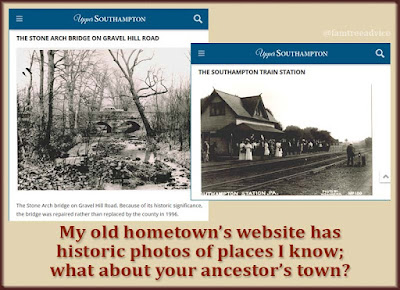My earliest family tree breakthroughs came from municipal websites. I was impressed, 15 years ago, by how many small towns in Italy had an information-packed website. Today, you may find a website for almost any town or township anywhere in your country or your old country.
I remember being very interested in my most recently discovered ancestral hometown. I went to the town's website and decided to send an email to the webmaster. To my delight, he wrote back to me with documents for the births and marriage of my great grandparents.
With the explosion of interest in ancestry, town webmasters may not be so generous today. They'd be overrun by requests!
Still, there's a lot you can learn by finding these town websites. My favorite thing to do with Italian town websites is search for their history (storia) page. Here's what I learned about one hometown: Sant'Angelo a Cupolo.
- The name of the town comes from (a) their patron saint, Michael the Archangel, shortened to Sant'Angelo; and (b) the fact that it sits up on a hill, or dome (cupolo). So, it's the town of St. Michael the Archangel which sits up on a hill.
- The first mention of the town is in a document from the year 1065!
- The most sacred landmark in their neighborhood is the statue of the Madonna del Rosario. The name of the church where my ancestors were baptized and married is Santa Maria Santissima del Rosario. The statue must be next to or inside the church.
- The convent I saw on a distant hill on my first visit to the town dates back to 1775. That means every ancestor I can name also saw that building up on the hill.
- The typical dishes of the town are tagliatelle, cecatielli, fusilli, stuffed peppers, and tripe (eww).
- The main religious holidays for my great grandparents' neighborhood are the feasts of San Biagio and San Giuseppe (the name of their piazza).
 |
| Your ancestral hometown website can give you a taste of what it's like to live there, and how it was for your ancestors. |
There's also information that's important to people who live in the town today:
- Photographs of the town.
- The town's elected officials. You may recognize some last names.
- Local businesses.
- Resolutions and ordinances.
- Local organizations.
- Places of worship.
Whoa! That last fact may have helped solve a long-standing mystery about my 2nd great grandfather, Antonio Saviano. I have a 1925 photo of him in his coffin, and there is a ribbon pinned to his jacked. It's hard to read, but it seems to match the name of the church in one of the town's neighborhoods. Maria Santissima delle Grazie translates to holy Mary of the graces. Maybe Antonio was a supporter of the church from his new home in the Bronx.
Let's try a U.S. town now. I lived in Southampton, Pennsylvania, for many years. Like many U.S. town websites, Southampton offers:
- A way to reach its different administrative departments.
- Meeting minutes from the town council.
- A calendar of upcoming events.
- The town's history, which began in 1685—ancient by U.S. standards.
- Historic photos.
- A list of townsmen who fought in the Revolutionary War. Very cool!
 |
| Hometowns across the United States are highly likely to have a website featuring a bit of their history. |
If you don't know much about your ancestors' hometowns, it'll be a real treat to browse their websites.
What if your town doesn't have a website? My family tree contains the town of Spondon, Derbyshire, England. When I searched, I didn't find a town website for Spondon. What I did find is a bunch of websites providing some of the same information as the town websites.
- Wikipedia can give you the town's statistics and history.
- The FamilySearch.org wiki also has information about the town. Plus you get a list of the town's documents available on FamilySearch.
- You can find photos and maps for your town in your search results.
- Scour those search results for more insights into the town.
 |
| An image search for your ancestors' hometown may show you landmarks from their time. |
I want to make sure my future visits to my ancestral hometowns happen on one of their feast days. That way, I'll have the chance to see many more townspeople than I have before. Find out about your town's attractions and their history before you visit. Or search for photos and feel as if you're there.
Give it a try!



